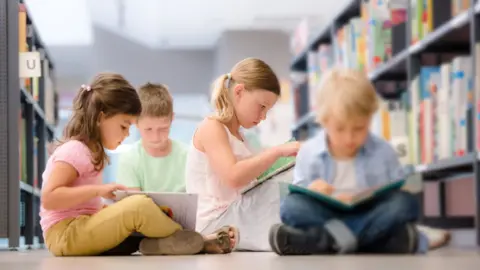Poorer seven-year-old pupils' improvement short of target
 vm/Getty Images
vm/Getty Images Challenging new attainment targets for poorer seven-year old pupils have not been met, latest figures have shown.
Despite year-on-year improvements, the numbers of pupils on free school meals reaching the foundation phase indicator fell short of the 80% target.
It was set two years ago after initial targets were hit three years early.
The Welsh Government said reducing the gap between poorer pupils and their classmates was at the heart of its national mission to raise standards.
Pupils in the "learning through play" early years are assessed on their personal and social development, literacy and communication skills, as well as how they are developing in maths.
Latest figures show 75.9% of seven-year-old pupils from lower income families achieved the expected level at the end of the foundation phase.
And although the gap between those who receive free school meals and those who do not has narrowed to 14.3%, that too fell short of the target.
Education Secretary Kirsty Williams said: "Right across the UK too often people's life chances are determined by their family's background.
"All our education reforms, such as reducing class sizes, curriculum reform, and supporting rural schools, are intrinsically linked to addressing this injustice.
"While the attainment gap for our youngest learners has narrowed over recent years, there is no room for complacency."
She said an extension of the Pupil Development Grant (PDG), doubling the financial support to early years learners in the Foundation Phase would help reach the disadvantaged learners "at the earliest possible stage".
Statisticians say it is not possible to assess whether a separate target for raising attainment at GCSE has been met because of changes to the data.
The gap in performance increases at every stage of school, and by Year 11 there is a difference of more than 30% in achievement at GCSE.
Welsh Government statistics show the percentage of pupils from lower income families who got five good GCSEs including English or Welsh and Maths is 28.6%.
After narrowing in previous years, the gap with pupils who did not receive free school meals has widened to 32.4% - up from 31.2% in 2016.
Children's Commissioner Sally Holland says there is "no simple answer" to closing the gap but schools can make a difference.
"There's a lot that can happen in the school, in the classroom, that can make a difference because we know some schools do narrow that gap and do it really well," she said.
"But I think it's really important to remember that what happens in the classroom - especially by the time children get to secondary school - is not the only issue here."
Ms Holland said by the time children started primary school those from the poorest backgrounds could be 18 months behind those from the richest backgrounds in their development.
"So we know that early years intervention is one of the most important things we can do to help children from all backgrounds to succeed," she added.
